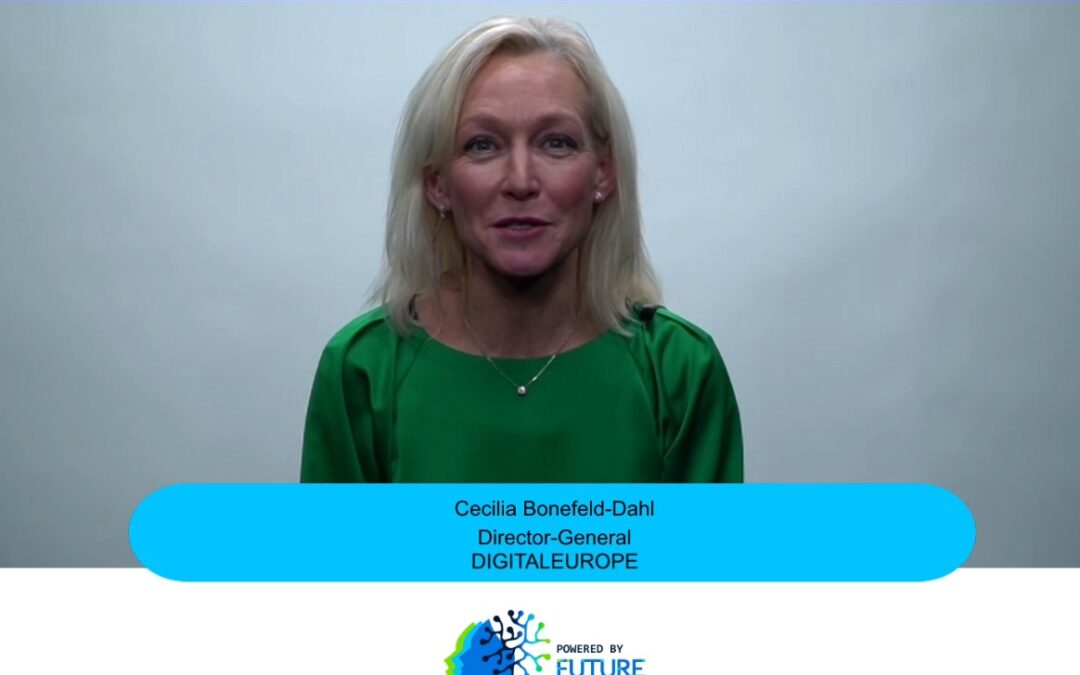Women in the tech industry still encounter wage gaps, earning on average 13 percent less than their male counterparts. Despite inspiring examples of women in executive positions, such as CEOs in technology, their representation across the industry remains disproportionately low, at only 8%. This percentage is far from expectations. Moreover, women comprise just 13% of the management staff in the tech sector, maintaining the same disparity in earnings – these inequalities were highlighted by Cecilia Bonefeld-Dahl, Director General of DIGITALEUROPE – during the 5th international edition of Women in IT Day, organized in collaboration with Future Collars, DIGITALEUROPE, and the European Women’s Association.
WATCH: Women in tech earn 13% less than men – Cecilia Bonefeld-Dahl, DIGITALEUROPE
There is an urgent need to strengthen the presence of women in the ICT sector, where currently only one in five specialists is a woman. In areas such as advanced AI technologies, their participation drops to a mere 5%, highlighting a significant gap, especially in more specialized roles.
We face the challenge of increasing the number of women in rapidly developing sectors like data analysis, artificial intelligence, and cybersecurity. These areas not only offer intellectual challenges but also the opportunity to work on breakthrough solutions with potential significant impacts on improving public health, protecting the environment, and efficiently using energy.
To encourage more women to pursue careers in technology from early stages of education, it is necessary to reshape the approach to teaching. Introducing practical applications of technology can make these fields more accessible and understandable. Innovative teaching methods and increased representation of women can be key to change. It is estimated that by 2030, 20 million ICT specialists will be needed to meet innovations in Europe, with a current shortfall of 300,000 cybersecurity experts. Working in this area, comparable to the role of a technical detective, is essential for protecting our democracies.
Despite inspiring examples of women in leadership positions in technology, the overall participation of women in the industry remains at only 8%, far from expectations. Moreover, women constitute only 13% of the management staff, earning on average 13% less than their male colleagues. Differences in risk-taking between genders may be one explanation for this situation. To reverse this dynamic, it is crucial not only to promote a greater number of women in technology but also to create an environment that supports their professional development. Such an environment should actively support women, enabling them to develop the skills necessary to work in this rapidly evolving industry.
Cecilia Bonefeld-Dahl
Our perfectionism and fear of risk often pose obstacles. It’s important to adopt an attitude of openness to change and readiness to attempt, treating mistakes as part of the learning process. Raising children in the spirit of courage to make mistakes and perceiving constructive criticism as an opportunity to learn is equally important. Life’s challenges require us to be resilient and determined, so that women can take the place they deserve, utilizing their qualifications, innovation, and creativity in creating solutions based on data and artificial intelligence – Cecilia Bonefeld-Dahl emphasized.
Combatting prejudice
Promoting equality is crucial in our society, not only in the context of gender equality but also regarding sexual diversity, age, and other forms of diversity. Unfortunately, there are still regions of the world where women’s rights are significantly limited, which obliges us to actively engage and act for change.
Combatting prejudice requires from us empathy and a deep understanding that unconscious biases are part of each of us, including me. It’s natural to have our own beliefs and stereotypes. However, it is essential that we are aware of these biases and actively strive to eliminate them. We should approach this process with distance, maintaining resilience and continually striving to achieve our goals. Belief in our own competencies enables us to achieve set goals and long-term success in our careers, instead of allowing minor adversities or misunderstandings to have too much impact on us.
Gender Equality in Technology: Why is it Important?
During Women in IT Day, Cecilia emphasized the significant gender pay gap, noting that women earn on average 13% less than their male colleagues. “These data are not just numbers; they illustrate a deep need for work towards achieving equality,” she remarked, highlighting the importance of building awareness and engaging in actions aimed at change. Cecilia cited the story of Ada Lovelace, who became an icon of women’s potential in technology, despite obstacles and stereotypes that have lasted for centuries, pointing to the “historical and invaluable contribution of women to technological development, which has often been overlooked.” Despite progress towards gender equality, there is still a long way to go.
Inspiring Women at the Forefront of Technology
Cecilia cited numerous examples of women who have broken barriers and achieved success in technology. She mentioned Mira Murati from OpenAI, Whitney Wolfe Herd from Bumble, Elizabeth Theophille from Novartis, Christel Heydemann from Orange, and Meg Whitman, former CEO of eBay and HP, as examples of women who have not only achieved significant success but also are shaping the world through technology.
She emphasized the importance of the visibility of women in high positions to motivate future generations to strive for equality and realize their own aspirations. She also mentioned influential women in the field of digital policy, such as Margrethe Vestager and Lisa Foer, who have a significant impact on shaping the digital future.
The future of technology depends on the engagement, talents, and perspectives of women at all levels – from management and innovation to political issues. Stories like Ada Lovelace’s or Mira Murati’s show that with the right support and equal opportunities, women can significantly contribute to technological and social development, shaping a new era of innovation and equality.
Cecilia, sharing her rich professional experience, delivers a set of tips that she has successfully implemented in her career. These tips are the fruit of her personal reflections and successes. Cecilia encourages every woman to take control of her professional life, emphasizing that actively shaping one’s career path is the key to success. Here are her recommendations:
- Choose a sector with a future – Working in such a sector is not only more exciting but also offers a chance for a real impact on the world. When I began my journey in technology, there was a debate over choosing between mainframes and PCs. Today, thanks to technology, we have the opportunity for innovations aimed at protecting our planet, for example, by reducing CO2 emissions by 20% using AI in construction or agriculture. Technology is a catalyst for change.
- Don’t take criticism personally – In your career, you will encounter prejudices and skepticism that you won’t be able to change. Remember, other people’s limitations do not define your possibilities. Treat it as motivation to move forward and strive to achieve your own goals.
- Be prepared for sacrifices – To achieve exceptional success, such as a CEO or CTO position, be prepared for long working hours and the possibility of missing some family moments. It’s important to maintain balance and remember that these sacrifices are part of the path to success.
- Maintain resilience – Treat your career like a game in which you can actively influence the change of rules. At Digital Europe, I managed to create a balanced team, showing that diversity and inclusion are key to success.
- Build a support network – Surround yourself with people who will be your support, from whom you can learn, and to whom you can pass on your knowledge. Don’t forget to keep in touch with them, even during career breaks.
- Develop specialized skills – Solid foundations in areas such as mathematics or programming are the foundation that will enable you to develop both hard and soft skills. You don’t have to be an expert, but knowledge in these areas opens up new opportunities.
Technology offers countless opportunities to contribute to better solutions in medicine, combat global challenges, and create innovations. It is a fascinating career path that offers a chance for real change. I encourage you to explore technology as an area where you can develop your passions and skills.
Obstacles and Challenges: Personal Experiences
Cecilia Bonefeld Dahl shares her personal experiences with discrimination and stereotypes she encountered on her career path, emphasizing the importance of confronting injustice and striving for equality. Her career, starting from studies in international business administration, quickly gained momentum through her work at IBM, moving on to Oracle, and then to being the CEO of a smaller company and consulting for NATO and the European Commission. Cecilia did not see herself in a special light due to her gender, despite being raised in a family with strong academic roots.
Throughout her career, Cecilia faced challenges, including pay inequality and lack of recognition for her work, which prompted her to actively demand justice. Her determination and pursuit of equality not only resulted in deserved recognition and a raise but also became an inspiration, showing that it is possible to break professional barriers. Her story proves that confronting injustice and stereotypes can lead to change, provided there is determination and a pursuit of equal treatment. Cecilia showed that flexibility and adaptation in the face of adversity are key to professional development. Her experience with mistaken roles during a business trip, where she was mistakenly assumed to be part of the catering staff instead of a VP, highlights how stereotypes can affect the perception of competence. Nonetheless, her ability to handle such situations with humor and professionalism contributed to building strong professional relationships.
Cecilia Bonefeld Dahl is an example that crossing boundaries, consistently striving for equality, and the ability to deal with stereotypes and discrimination can not only bring personal success but also inspire other women to take action and make changes in the tech industry and beyond. Her story is a message that despite obstacles, achieving equality and justice in the professional environment is possible.
The Role of Education and Mentorship
Cecilia emphasized the importance of education and mentorship for women in technology, noting the need to increase their presence in STEM fields. Initiatives such as “Women for IT” are crucial for retraining women as ICT specialists. As the newly appointed president of the Danish IT Association, she initiated the creation of a community for women, promoting mutual support, knowledge exchange, and skill development in IT.
Inspired by her experience as one of the few female CEOs at a conference dominated by men, Cecilia was motivated to take action, which resulted in the formation of a community of female leaders in technology. Her work as president influenced the introduction of diversity guidelines, achieving gender balance on the board. Under the direction of the current COO, the “Women for IT” program enabled the training of 900 women as ICT specialists, with 70% finding employment or starting their own business shortly after training.
These efforts confirm Cecilia’s belief in the importance of striving for equality, which translates into creating innovative and diverse solutions that drive progress.
***
Cecilia Bonefeld-Dahl has over 25 years of experience in the ICT industry, holding international positions at companies such as IBM and Oracle and creating enterprises worldwide. Her commitment to promoting diversity and equality in technology has been recognized through membership in various forums and groups, including the European Industrial Forum and the ENISA Cybersecurity Certification Group. For her efforts in supporting Ukraine during the war, she received the Ukraine Peace Prize on behalf of DIGITALEUROPE in March 2023. Her career and activities serve as an example for women worldwide striving to achieve equality in the technology industry.
***
The 5th edition of “Women in IT Day 2023,” under the theme “Technology is changing the world before our eyes – be a part of this breakthrough!” was organized by Future Collars, in cooperation with EWA European Women’s Association and DIGITALEUROPE, as part of the Erasmus+ project. “Women in IT Day 2023” is a free online conference dedicated to women who want to consciously shape their career paths in IT. The event offers eight hours of an intensive program, including lectures, debates, meetings with potential employers, workshops, speed mentoring sessions, and a wealth of knowledge and inspiration.
The main goal of the event is to support women in the technology sector through education, relationship building, and mentorship. It features female leaders and experts from the Polish and European IT industry, sharing their knowledge and experience.
Future Collars, the primary organizer, is an online school for programming and digital skills, offering unique teaching methods. It is aimed both at individuals looking to change their career direction and enter the world of IT, and at companies seeking effective developmental programs for their employees.
More: www.womeninitday.com
WOMEN IN IT DAY 2023
THANK YOU FOR BEING WITH US:
MAIN PARTNER: PKO Bank Polski, Centralny Ośrodek Informatyki, Accenture, BNP Paribas Bank Polska, Orange, Point72, PwC, Totalizator Sportowy, GPW, SimCorp HONOR PARTNER: Ministerstwo Rodziny i Polityki Społecznej, Ministerstwo Cyfryzacji, KIGEIT Krajowa Izba Gospodarcza Elektroniki i Telekomunikacji, POLSA Polska Agencja Kosmiczna, SGH Szkoła Główna Handlowa CONTENT PARTNER: HR Hints, flexi.pl, Fundacja Jolanty Kwaśniewskiej Porozumienie Bez Barier, Stowarzyszenie Blockchain Polska, IAESTE International Association for the Exchange of Students for Technical Experience, Bring Women Back to Work, Youth Human Impact, Fundacja Kobiety Medycyny, CCIFP Francusko-Polska Izba Gospodarcza, Challenge Rocket com, Fundacja Rozwoju Społeczeństwa Wiedzy THINK! Konfederacja Lewiatan, Challenge Rocket, Think, Hack Yeah, MMC Polska, FOB Forum Odpowiedzialnego Biznesu, She Skillz Global, Polska Izba Informatyki i Telekomunikacji PIIT, Fundacja Liderek Biznesu, Cyber Women Community, Cyber Clue, OPI Ośrodek Przetwarzania Informacji, Sukces Pisany Szminką, Fundacja Share the Care, DATA Economy Congress, SoDA Software Development Association Poland, NESsT, Instytut Bez Stresu, Fin Tech, Eklektika – Language Means Business, Talenti, No Fluff Jobs, IT Girls, True ME PATRONAT
MEDIA PARTNER: BusinessWoman&life, Comparic.pl, Portfel Polaka, reach4.biz, TVP Bydgoszcz, Biotechnologia.pl, Mamo Pracuj, Polska Sky, BiznesTuba, Fintek, Przedsiębiorcy.eu, IT Poland technology cluster, di24,pl, AIoAi 5 EDYCJA WOMEN IN IT DAY JEST CZĘŚCIĄ PROGRAMU ERASMUS+ w KOOPERACJI: Future Collars, DIGITALEUROPE, European Women’s Association






